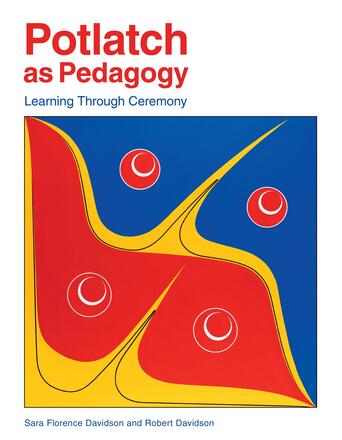
Potlatch as Pedagogy
Learning Through Ceremony
Based on the potlatch, the foundational ceremony of the Haida people, Potlatch as Pedagogy presents a model for learning that is holistic, relational, practical, and continuous.
La description
In 1884, the Canadian government enacted a ban on the potlatch, the foundational ceremony of the Haida people. The tradition, which determined social structure, transmitted cultural knowledge, and redistributed wealth, was seen as a cultural impediment to the government’s aim of assimilation.
The tradition did not die, however; the knowledge of the ceremony was kept alive by the Elders through other events until the ban was lifted. In 1969, a potlatch was held. The occasion: the raising of a totem pole carved by Robert Davidson, the first the community had seen in close to 80 years. From then on, the community publicly reclaimed, from the Elders who remained to share it, the knowledge that has almost been lost.
Sara Florence Davidson, Robert’s daughter, would become an educator. Over the course of her own education, she came to see how the traditions of the Haida practiced by her father—holistic, built on relationships, practical, and continuous—could be integrated into contemporary educational practices. From this realization came the roots for this book.
Reviews
An uplifting, inspiring, and insightful book. Indigenous pedagogy is a developing field of study and practice to which this work is a valuable contribution. Given that Indigenous cultural revitalization and celebration is frequently localized in regard to community and national relevance, this book’s focus on Haida is essential. Davidson and Davidson offer readers an important exploration of how one nation’s culture, knowledge, and protocols can inform pedagogy for the better.
- Dr. Frank Deer, Canada Research Chair and Associate Professor, University of Manitoba
In 1969, Sara’s father Robert raised a totem pole in the community, demonstrating a commitment to tradition and stitching together stories and practices from community Elders that helped to honour traditional wisdom and revive Indigenous knowledge. In recounting how her father learned traditions and took up totem carving and potlatching, Sara has raised a new pole with this book, and shares knowledge like gifts at a potlatch. Anyone reading this work will feel like they’ve been paid to witness what Indigenous knowledge and pedagogy looks like. We are blessed to have Potlatch as Pedagogy; reading it is truly nourishing. Sara shows us through lucid storytelling and collaborative remembering that Indigenous people are resilient and with commitment can heal from past trauma, revive traditions, reinterpret them for application in the contemporary moment, and in the process make ourselves whole again.
- Dr. Jean-Paul Restoule, Professor and Chair, Indigenous Education, University of Victoria
This is not a book to be read quickly; it requires reflection to fully appreciate its content, purpose, and value. But time spent with Potlatch as Pedagogy will connect you with the Davidsons’ stories and enrich your understanding of Haida knowledge, culture, and historical struggles; and stimulate thought for considering how Indigenous knowledge, storytelling, and pedagogies could be included in educational practices.
Highly Recommended
- Anita Miettunen
These nine sk’ad’a principles can serve as the threads to strengthen our teaching practice. As educators we have a great responsibility to learn and teach Indigenous history and knowledge. But we can also weave Indigenous pedagogy into our everyday teaching practice. Potlatch as Pedagogy is an accessible, engaging and heartfelt work.
- ETFO Voice